最全面人教版八年级上册英语期末总复习归纳整理
- 格式:docx
- 大小:519.33 KB
- 文档页数:110
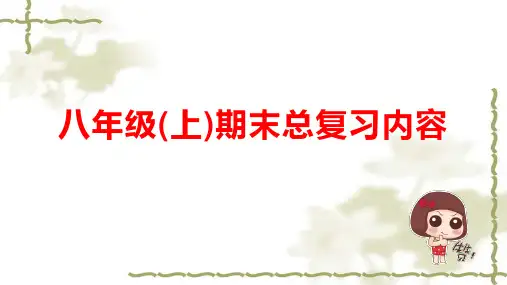
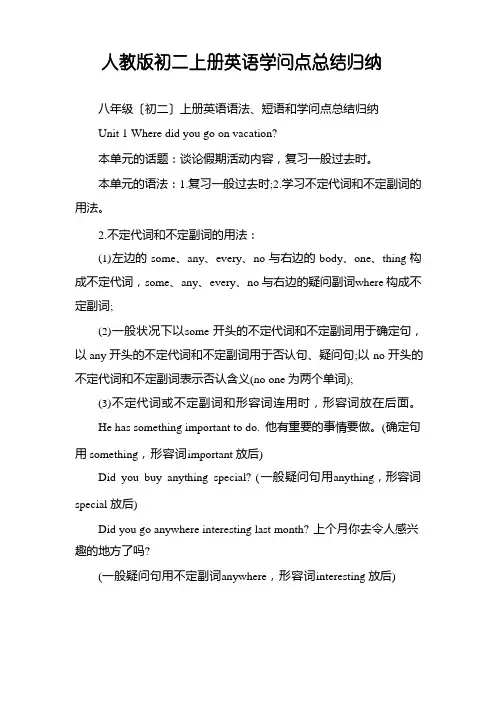
人教版初二上册英语学问点总结归纳八年级〔初二〕上册英语语法、短语和学问点总结归纳Unit 1 Where did you go on vacation?本单元的话题:谈论假期活动内容,复习一般过去时。
本单元的语法:1.复习一般过去时;2.学习不定代词和不定副词的用法。
2.不定代词和不定副词的用法:(1)左边的some、any、every、no 与右边的body、one、thing 构成不定代词,some、any、every、no 与右边的疑问副词where 构成不定副词;(2)一般状况下以some 开头的不定代词和不定副词用于确定句,以any 开头的不定代词和不定副词用于否认句、疑问句;以no 开头的不定代词和不定副词表示否认含义(no one 为两个单词);(3)不定代词或不定副词和形容词连用时,形容词放在后面。
He has something important to do. 他有重要的事情要做。
(确定句用something,形容词important 放后)Did you buy anything special? (一般疑问句用anything,形容词special 放后)Did you go anywhere interesting last month? 上个月你去令人感兴趣的地方了吗?(一般疑问句用不定副词anywhere,形容词interesting 放后)(4)不定代词和不定副词做主语时,后面的动词用单数形式。
Everone is here today.今日每个人都在这里。
本单元的短语和学问点:1.go on vacation 去度假go to the mountains 上山/进山2.s tay at home 呆在家go to the beach 去海滩visit museums 参观博物馆go to summer camp 去参观夏令营3. study for tests 为考试而学习\备考go out 出去4. quite a few 相当多,不少(后跟可数名词复数)take photos 照相most of the time大局部时间5.buy sth for sb = buy sb sth为某人买某物6.taste good. 尝起来很好taste(尝起来)、look(看起来)、sound(听起来)为感官动词,后跟形容词7.h ave a good\great\fun time 过得快活,玩得开心(=enjoy oneself) 8. go shopping 去购物9. nothing…but+动词原形:除了……之外什么都没有He had nothing to do at home but read yesterday.昨天他在家除了读书无事可做。
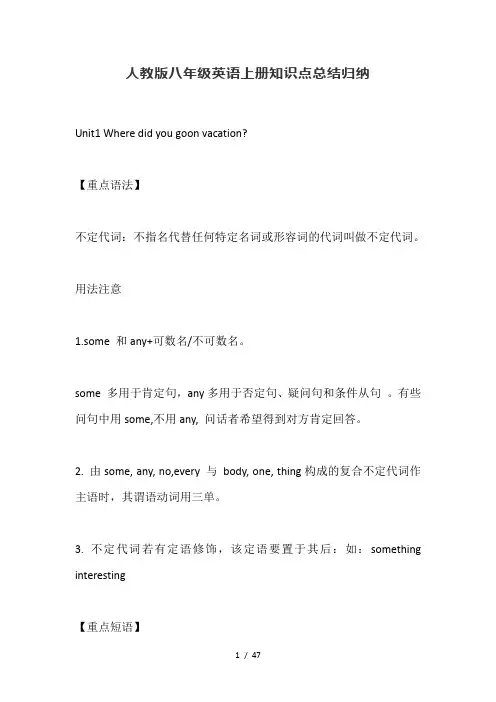
人教版八年级英语上册知识点总结归纳Unit1 Where did you goon vacation?【重点语法】不定代词:不指名代替任何特定名词或形容词的代词叫做不定代词。
用法注意1.some 和any+可数名/不可数名。
some 多用于肯定句,any多用于否定句、疑问句和条件从句。
有些问句中用some,不用any, 问话者希望得到对方肯定回答。
2. 由some, any, no,every 与body, one, thing构成的复合不定代词作主语时,其谓语动词用三单。
3. 不定代词若有定语修饰,该定语要置于其后:如:something interesting【重点短语】1. buy sth for ab./ buy sb. sth 为某人买某物2. taste + adj. 尝起来……3. nothing...but + V.(原形)除了……之外什么都没有4. seem + (to be) + adj 看起来5. arrive in + 大地方/ arrive at + 小地方到达某地6. decide to do sth. 决定做某事7. try doing sth. 尝试做某事/ try to do sth. 尽力做某事8. enjoy doing sth. 喜欢做某事9. want to do sth. 想去做某事10. start doing sth. 开始做某事=begin doing sth.11. stop doing sth. 停止做某事区分:stop to do sth. 停下来去做某事12. dislike doing sth. 不喜欢做某事14. so + adj + that + 从句如此……以至于……16. tell sb. (not) to do sth. 告诉某人(不要)做某事17. keep doing sth. 继续做某事18. forget to do sth. 忘记去做某事/ forget doing sth 忘记做过某事【词语辨析】1. take a photo/ take photos 拍照quite a few+名词复数“许多…”2. seem + 形容词看起来…... You seem happy today.seem + to do sth. 似乎/好像做某事I seem to have a coldIt seems + 从句似乎..…. It seems that no one believe you.seem like ... 好像,似乎….. It seems like a good idea.3. arrive in +大地点= get to= reach+地点名“到达......”arrive at +小地点(注:若后跟地点副词here/there/home, 介词需省略,如:arrive here; get home)4. feel like sth 感觉像…feel doing sth. 想要做某事5. wonder(想知道)+疑问词(who, what, why)引导的从句。
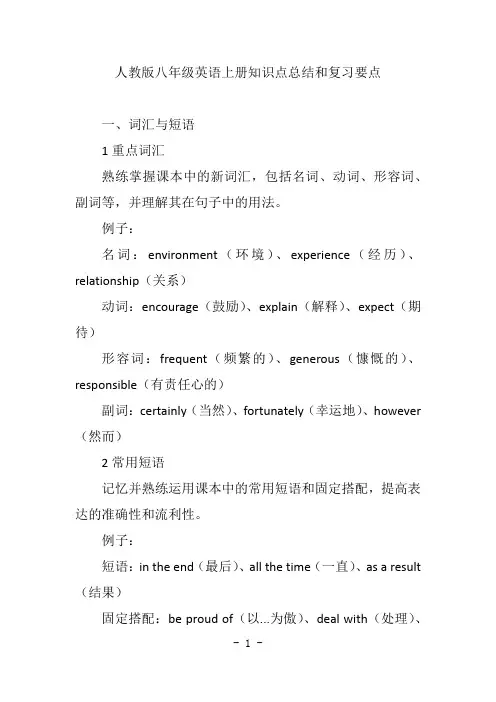
人教版八年级英语上册知识点总结和复习要点一、词汇与短语1重点词汇熟练掌握课本中的新词汇,包括名词、动词、形容词、副词等,并理解其在句子中的用法。
例子:名词:environment(环境)、experience(经历)、relationship(关系)动词:encourage(鼓励)、explain(解释)、expect(期待)形容词:frequent(频繁的)、generous(慷慨的)、responsible(有责任心的)副词:certainly(当然)、fortunately(幸运地)、however (然而)2常用短语记忆并熟练运用课本中的常用短语和固定搭配,提高表达的准确性和流利性。
例子:短语:in the end(最后)、all the time(一直)、as a result (结果)固定搭配:be proud of(以...为傲)、deal with(处理)、pay attention to(注意)二、句型与语法1基本句型熟练掌握五种基本句型,包括主语+谓语、主语+谓语+宾语、主语+谓语+间接宾语+直接宾语、主语+谓语+宾语+宾语补足语、主语+系动词+表语。
例子:主语+谓语:She sings.(她唱歌。
)主语+谓语+宾语:I like apples.(我喜欢苹果。
)主语+谓语+间接宾语+直接宾语:He gave me a book.(他给了我一本书。
)主语+谓语+宾语+宾语补足语:I found the book interesting.(我发现这本书很有趣。
)主语+系动词+表语:She is beautiful.(她很漂亮。
)2时态深入学习并掌握现在完成时、过去进行时、一般将来时、过去将来时等时态的用法和形式。
例子:现在完成时:I have already seen that movie.(我已经看过那部电影了。
)过去进行时:They were playing football when I called them.(我打电话给他们时,他们正在踢足球。
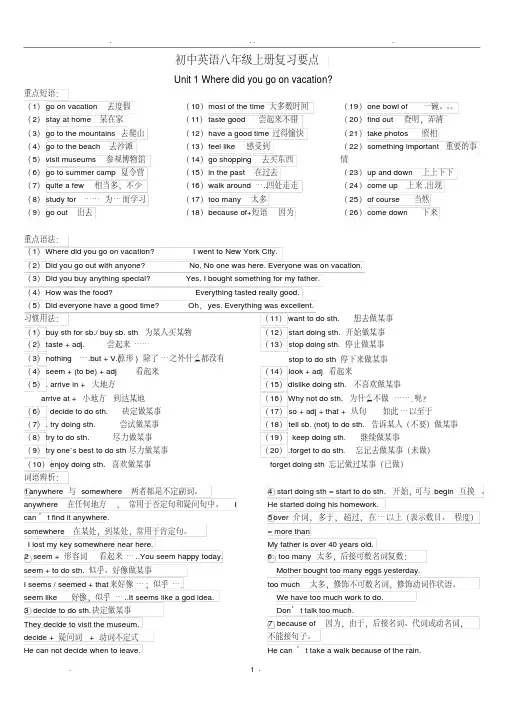
初中英语八年级上册复习要点Unit 1 Where did you go on vacation?重点短语:(1)go on vacation 去度假(2)stay at home 呆在家(3)go to the mountains 去爬山(4)go to the beach去沙滩(5)visit museums 参观博物馆(6)go to summer camp 夏令营(7)quite a few 相当多,不少(8)study for……为…而学习(9)go out 出去(10)most of the time大多数时间(11)taste good 尝起来不错(12)have a good time过得愉快(13)feel like 感受到(14)go shopping 去买东西(15)in the past 在过去(16)walk around…..四处走走(17)too many 太多(18)because of+短语因为(19)one bowl of 一碗。
(20)find out 查明,弄清(21)take photos 照相(22)something important 重要的事情(23)up and down 上上下下(24)come up 上来,出现(25)of course 当然(26)come down 下来重点语法:(1)Where did you go on vacation? I went to New York City.(2)Did you go out with anyone? No, No one was here. Everyone was on vacation.(3)Did you buy anything special? Yes, I bought something for my father.(4)How was the food? Everything tasted really good.(5)Did everyone have a good time? Oh,yes. Everything was excellent.习惯用法:(1)buy sth for sb./ buy sb. sth 为某人买某物(2)taste + adj. 尝起来……(3)nothing ….but + V.(原形) 除了…之外什么都没有(4)seem + (to be) + adj 看起来(5). arrive in + 大地方arrive at + 小地方到达某地(6)decide to do sth. 决定做某事(7). try doing sth. 尝试做某事(8)try to do sth. 尽力做某事(9)try one`s best to do sth尽力做某事(10)enjoy doing sth. 喜欢做某事(11)want to do sth.想去做某事(12)start doing sth. 开始做某事(13)stop doing sth. 停止做某事stop to do sth 停下来做某事(14)look + adj 看起来(15)dislike doing sth. 不喜欢做某事(16)Why not do sth. 为什么不做…….呢?(17)so + adj + that + 从句如此…以至于(18)tell sb. (not) to do sth. 告诉某人(不要)做某事(19)keep doing sth. 继续做某事(20).forget to do sth. 忘记去做某事(未做)forget doing sth忘记做过某事(已做)词语辨析:○1anywhere 与somewhere 两者都是不定副词。
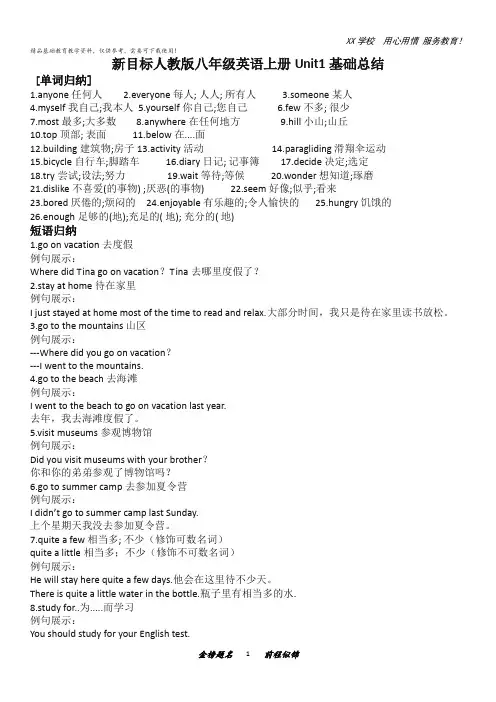
精品基础教育教学资料,仅供参考,需要可下载使用!新目标人教版八年级英语上册Unit1基础总结[单词归纳]1.anyone 任何人2.everyone 每人; 人人; 所有人3.someone某人4.myself我自己;我本人5.yourself你自己;您自己6.few 不多; 很少7.most 最多;大多数8.anywhere 在任何地方9.hill 小山;山丘10.top 顶部; 表面11.below在....面12.building 建筑物;房子13.activity 活动14.paragliding 滑翔伞运动15.bicycle 自行车;脚踏车16.diary 日记; 记事簿17.decide 决定;选定18.try尝试;设法;努力19.wait 等待;等候20.wonder 想知道;琢磨21.dislike 不喜爱(的事物) ;厌恶(的事物) 22.seem 好像;似乎;看来23.bored 厌倦的;烦闷的24.enjoyable 有乐趣的;令人愉快的25.hungry 饥饿的26.enough足够的(地);充足的( 地); 充分的( 地)短语归纳1.go on vacation 去度假例句展示:Where did Tina go on vacation?Tina去哪里度假了?2.stay at home 待在家里例句展示:I just stayed at home most of the time to read and relax.大部分时间,我只是待在家里读书放松。
3.go to the mountains 山区例句展示:---Where did you go on vacation?---I went to the mountains.4.go to the beach 去海滩例句展示:I went to the beach to go on vacation last year.去年,我去海滩度假了。
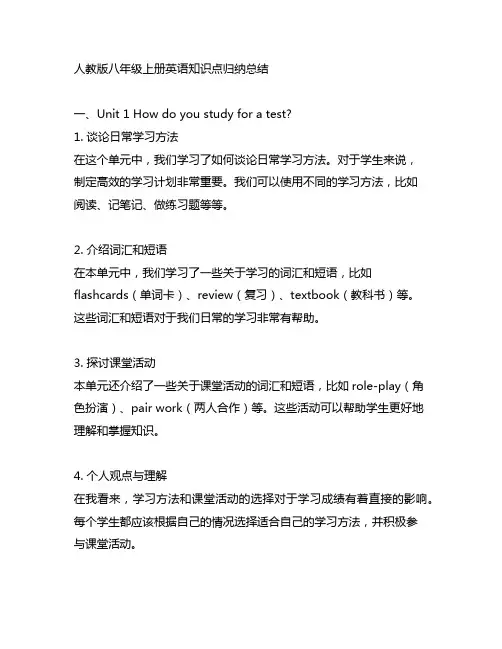
人教版八年级上册英语知识点归纳总结一、Unit 1 How do you study for a test?1. 谈论日常学习方法在这个单元中,我们学习了如何谈论日常学习方法。
对于学生来说,制定高效的学习计划非常重要。
我们可以使用不同的学习方法,比如阅读、记笔记、做练习题等等。
2. 介绍词汇和短语在本单元中,我们学习了一些关于学习的词汇和短语,比如flashcards(单词卡)、review(复习)、textbook(教科书)等。
这些词汇和短语对于我们日常的学习非常有帮助。
3. 探讨课堂活动本单元还介绍了一些关于课堂活动的词汇和短语,比如role-play(角色扮演)、pair work(两人合作)等。
这些活动可以帮助学生更好地理解和掌握知识。
4. 个人观点与理解在我看来,学习方法和课堂活动的选择对于学习成绩有着直接的影响。
每个学生都应该根据自己的情况选择适合自己的学习方法,并积极参与课堂活动。
二、Unit 2 I used to be afraid of the dark1. 谈论过去的经历和感受在这个单元中,我们学习了如何谈论过去的经历和感受。
通过学习used to (过去常常)结构,我们能更好地描述自己在过去的一些经历和感受。
2. 描述恐惧与挑战本单元还介绍了一些关于恐惧和挑战的词汇和短语,比如afraid(害怕)、brave(勇敢)、take risks(冒险)等。
这些词汇和短语帮助我们更好地表达自己的情感和观点。
3. 探讨过去的变化在本单元中,我们还学习了一些关于过去的变化的表达方式,比如used to(过去常常)、change(改变)等。
这些表达方式能够帮助我们更好地理解和描述一些过去的变化。
4. 个人观点与理解对我个人而言,过去的经历和感受对于我们的成长和发展有着重要的影响。
每个人都有自己的恐惧和挑战,只有勇敢面对,才能不断成长和进步。
三、Unit 3 I used to be indecisive, but now I'm not sure1. 谈论决定和不确定在这个单元中,我们学习了如何谈论自己的决定和不确定。
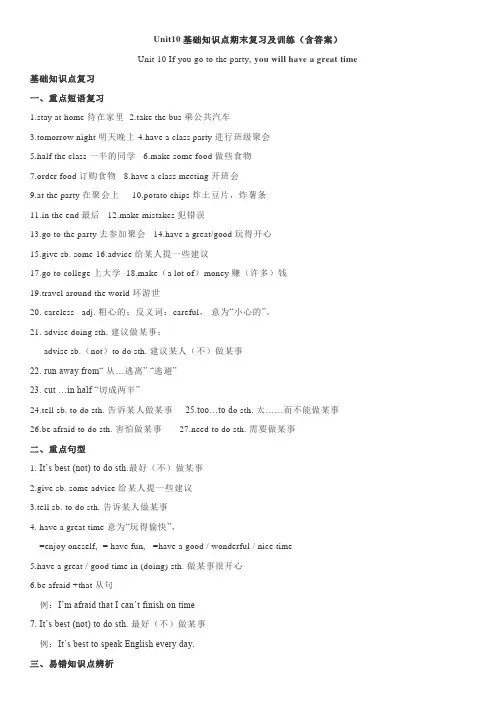
Unit10基础知识点期末复习及训练(含答案)Unit 10 If you go to the party, you will have a great time 基础知识点复习一、重点短语复习1.stay at home待在家里2.take the bus乘公共汽车3.tomorrow night明天晚上4.have a class party进行班级聚会5.half the class一半的同学6.make some food做些食物7.order food订购食物 8.have a class meeting开班会9.at the party在聚会上 10.potato chips炸土豆片,炸薯条11.in the end最后 12.make mistakes犯错误13.go to the party去参加聚会 14.have a great/good 玩得开心15.give sb. some 16.advice给某人提一些建议17.go to college上大学 18.make(a lot of)money赚(许多)钱19.travel around the world环游世20. careless adj. 粗心的;反义词:careful,意为“小心的”。
21. advise doing sth. 建议做某事;advise sb.(not)to do sth. 建议某人(不)做某事22. run away from“从…逃离” “逃避”23. cut …in half “切成两半”24.tell sb. to do sth. 告诉某人做某事25.too…to d o sth. 太……而不能做某事26.be afraid to do sth. 害怕做某事 27.need to do sth. 需要做某事二、重点句型1. It’s best (not) to do sth.最好(不)做某事2.give sb. some advice给某人提一些建议3.tell sb. to do sth. 告诉某人做某事4. have a great time 意为“玩得愉快”,=enjoy oneself, = have fun, =have a good / wonderful / nice time5.have a great / good time in (doing) sth. 做某事很开心6.be afraid +that从句例:I’m afraid that I can’t finish on time7. It’s best (not) to do sth.最好(不)做某事例:It’s best to speak English every day.三、易错知识点辨析1. be afraid to do sth. 害怕干某事例句1、I’m afraid to speak in front of other people.be afraid of sth. 害怕某事例句2、He told me not to be afraid of difficulties.be afraid +that从句例句3、I’m afraid that I can’t finish on time2. advise v.“劝告;建议”n. advice,是不可数名词.例句1、Give me some advice!advise doing sth. 建议做某事。
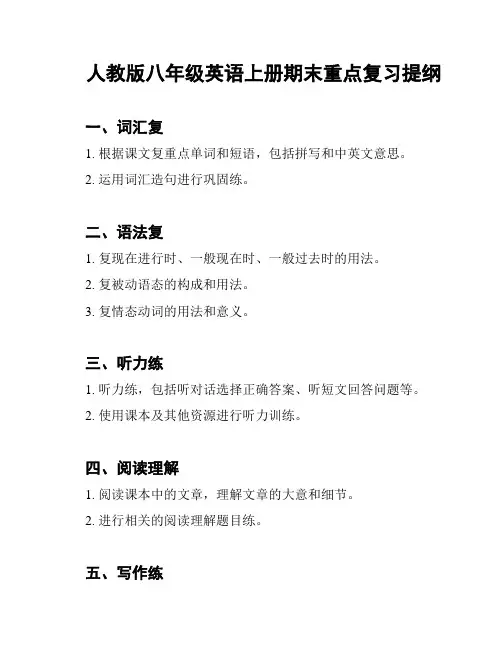
人教版八年级英语上册期末重点复习提纲
一、词汇复
1. 根据课文复重点单词和短语,包括拼写和中英文意思。
2. 运用词汇造句进行巩固练。
二、语法复
1. 复现在进行时、一般现在时、一般过去时的用法。
2. 复被动语态的构成和用法。
3. 复情态动词的用法和意义。
三、听力练
1. 听力练,包括听对话选择正确答案、听短文回答问题等。
2. 使用课本及其他资源进行听力训练。
四、阅读理解
1. 阅读课本中的文章,理解文章的大意和细节。
2. 进行相关的阅读理解题目练。
五、写作练
1. 复书面表达的基本写作技巧,如写作句型和段落结构等。
2. 进行写作练,包括写信、写日记等。
六、口语练
1. 进行口语练,包括对话,描述图片等。
2. 复相关语法和词汇,提高口语表达能力。
七、复技巧和备考方法
1. 总结复经验,制定科学有效的复计划。
2. 尽量多做题,检验自己的掌握程度。
3. 注重练听力和口语,增强应试能力。
以上为人教版八年级英语上册期末重点复习提纲,希望能帮助你对课程内容进行系统复习,取得好成绩。
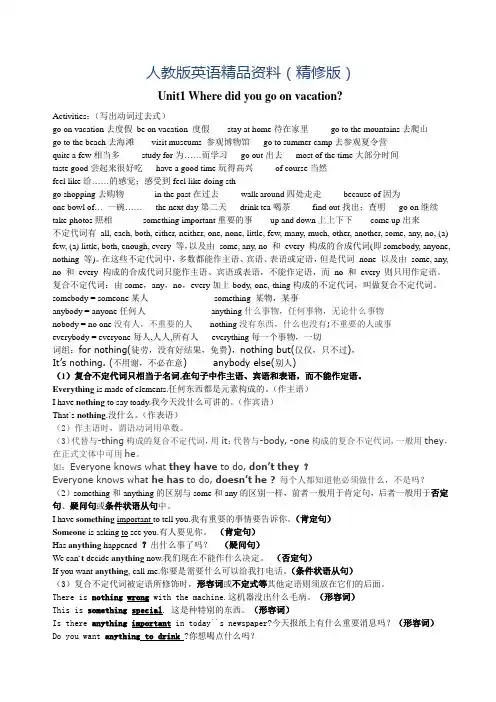
人教版英语精品资料(精修版)Unit1 Where did you go on vacation?Activities:(写出动词过去式)go on vacation去度假be on vacation 度假stay at home待在家里go to the mountains去爬山go to the beach去海滩visit museums 参观博物馆go to summer camp去参观夏令营quite a few相当多study for为……而学习go out出去most of the time大部分时间taste good尝起来很好吃have a good time玩得高兴of course当然feel like给……的感觉;感受到feel like doing sthgo shopping去购物in the past在过去walk around四处走走because of因为one bowl of…一碗……the next day第二天drink tea喝茶find out找出;查明go on继续take photos照相something important重要的事up and down上上下下come up出来不定代词有all, each, both, either, neither, one, none, little, few, many, much, other, another, some, any, no, (a) few, (a) little, both, enough, every 等,以及由some, any, no 和every 构成的合成代词(即somebody, anyone, nothing 等)。
在这些不定代词中,多数都能作主语、宾语、表语或定语,但是代词none 以及由some, any, no 和every 构成的合成代词只能作主语、宾语或表语,不能作定语,而no 和every 则只用作定语。

U nit 61.grow up 长大;成熟2.make sure 确保;查明3.be good at doing sth. 擅长做某事4.take up doing sth. 学着做某事;开始做某事5.go to university 去上大学6.have...in common 有…共同之处7.a kind of 一种8.try one's best to do sth. 尽某人的最大努力做某事9.take medicine 吃药10.too...to...太…而不能…11.practice doing sth 练习做某事12.keep on doing sth 继续做某事13.be sure about 确信;对…有把握14.at the beginning of 在…开始15.make a promise 许下诺言/承诺16.different kinds of 不同种类的17.have to do with 关于;与…有关系18.agree with sb. 同意某人的观点19.get good grades 取得好成绩20.write down 写下21.make resolutions 下决心22.for example 例如(修饰句子)Unit 71.in great danger 处于极度危险中2.play a part in doing sth. 参与;发挥作用3.look for 寻找;寻求4.hundreds of 许多;大量5.agree/disagree with 同意/不同意6.the same as 与...相同7.seem to do sth. 似乎;好像8.It seems that... 似乎;好像9.for example 例如(接句子)10.be able to do sth. 能够做某事11.in the future 在未来12.fall down 突然倒下;跌倒;倒塌13.wake up 醒来14.over and over again 多次;反复地15.make sb. do sth. 使某人做某事Unit 81.such as 例如(跟短语)2.turn on 接通(电流、煤气、水等);打开3.turn off 切断(电流、煤气、水等);关闭4.cover…with… 用...覆盖...5.be covered with 被覆盖6.fill…with… 用...装满...7.be filled with/be full of 充满...8. make+宾语+形容词使...怎么样9.a piece of 一片/块/段/首...10.one by one 一个接一个11.need doing sth 需要做某事(物作主语)12.how many+可数名词复数多少...13.how much+不可数名词多少...14.how to do sth. 如何做某事15.add...to... 把...添加到...上16.pour…into… 把...倒进...里17.cut up 切碎18.see…as… 把...看作...19.mix…and… 把...和...混合20.another 10 minutes=10 more/other minutes 另外10分钟21.at a very high temperature 以高温;在高温下22.want (sb.) to do sth. 想要(某人)做某事23.forget doing sth. 忘记做过某事(事情已做)24.forget to do sth. 忘记去做某事(事情未做)25.need to do sth. 需要做某事(人作主语)Unit 91.on Saturday afternoon 在周六下午2.prepare for... 为...做准备3.prepare to do sth. 准备做某事4.hang out 闲逛;常去某处5.hear from 收到(某人的)信、电话等6.not...until... 直到...才...7.at the end of... 在...的末尾8.refuse to do sth. 拒绝做某事9.look forward to doing sth. 期盼做某事10.invite sb. to do sth. 邀请某人做某事11.without doing sth. 没有做某事12.study for a test 准备考试13.look after=take care of=care for 照看;照顾14.turn down 拒绝;关小(音量)15.so that 以便;为了;所以16.the opening of ...开幕式/落成典礼17.the best way to do sth. 做某事的最佳方式18.see sb. doing sth. 看见某人正在做某事19.be glad to do sth. 乐于做某事Unit 101. have fun/enjoy oneself 玩得开心2. have problems doing sth. 在...方面有困难3. talk to/with sb. 和某人谈话4. keep...to oneself 保守秘密;把问题/烦恼埋在心底5. in the end 最后;终于6. advise sb. to do sth. 建议某人做某事7. advise doing sth. 建议做某事8. It’s best (not) to do sth. 最好(不)做某事9. too... to... 太...而不能...10. be angry with sb. 生某人的气11. be angry about sth. 因某事生气12. run away from 逃避;回避13. make mistakes 犯错14. ask sb. to do sth. 要求某人做某事15. be afraid to do sth. 害怕做某事16. be afraid of doing sth. 害怕做某事17. keep doing sth. 一直做某事18. worry about=be worried about 担心;担忧19. agree with sb. 同意某人(的观点)20. by mistake 错误地;无意中21. step by step 一步一步地22. by doing sth. 通过做某事。
人教版八年级上册英语期末复习:各单元常考必会语法知识点清单unit 11. something/anything / nothing /everything 用法* 不定代词+ adj something interesting * something“某事”用于肯定句,也用于表示建议或请求的问句中。
* anything 表示“某事”用于否定句或疑问句中,表示“任何事”用 if 引导条件句中。
*nothing=not--anything 表示用否定,everything 表示“一切,全部,所有”2. 辨析a few /few /little /a little*few, a few 接可数名词复数,little, a little 接不可数名词,形容词。
也可以修饰动词。
a few, a little 表示肯定意思:有一些,有一点;few, little 表示否定意思:“没有一些,没有一点”。
3. seem 用法* seem to do sth * it seems/seemed that 从句* it is seemed that 从句4. --ed 形容词---ing 形容词*ed 形容词主语是人,修饰人。
ing 形容词主语是物,修辞物。
5. 不同的“到达”*get to +地方,reach+ 地方,arrive in+ 大地方,arrive at+小地方home ,here,there 前不加介词。
6. decide 用法* decide to do sth 决定做某事make a decision 做出决定decide on 在---做决定7. try 用法* try to do sth 尽力做某事*try doing sth 尝试做某事*try one ’s best to do sth 尽某人最大努力做某事* try on /try it (them) on 试穿--*try out 尝试,实验* have a try 试一试8. wonder 用法*后跟 if 引导宾语从句9. different 用法*be different from 与---不同have many differences from--与--有不同之处10. 辨析 because / because of *because 后跟从句,because of 后跟名词(短语)11. enough * enough to do sth 足以做某事* 形容词/副词+enough 足够--- old enough 年龄足够大12. most 用法*most+名词复数*the most of+复数名词---的大部分* the most+多音节形容词,最---13. 辨析 too many/ too much / much too* too many+可数名词复数,too much+不可数名词,much too+形容词14. wait 用法*waiter 服务员*wait for 等待*can't wait to do sth 迫不及待做某事unit21. be good at doing sth 擅长做某事2. be good for (doing) sth 对(做)某事有益处3. health 用法*healthy 健康的keep/stay healthy 保持健康*unhealthy 不健康的* be in good health 处于健康状态4. surprise 用法* in surprise 吃惊地to one’s surprise 让某人吃惊的是* surprised 感到吃惊的,修饰人be surprised at 对---感到吃惊* surprising 吃惊的,修饰物。
八年级上册各单元重点知识归纳和练习巩固Unit 1 How often do you exercise?词组1. go to the movies去看电影2. look after = take care o照f 顾3. surf the internet上网20. activity survey活动调查21. do homework做家庭作业22. do house work做家务事4. healthy lifestyle健康的生活方式23. eat less mea吃t更少的肉5. go skate boarding去划板24. junk food垃圾食物6. keep healthy=stay health保y持健康25. be good for对什么有益7. exercise=take(much)exercise=do spo锻r t s炼8. eating habits饮食习惯9. take more exercise做更多的运动10. the same as与什么相同11. be different from不同12. once a month一月一次13. twice a week一周两次14. make a difference to对什么有影响15. how often 多久一次16. although = thoug 虽h然17. most of the students=most students18. shop=go shopping=do some shoppin购g物19. as for至于26. be bad for对什么有害27. want to do sth想做某事28. want sb to do sth想某人做某事29. try to do sth尽量做某事30. come home from scho放o l 学回家31. of course = certainly = sur当e 然32. get good grades取得好成绩33. some advice34. hardly=not nearly / almost n几ot乎不35. keep/be in good healt保h 持健康36. b e stressed紧张的,有压力的37. take a vacation去度假48.get back 回来Section A1. How often 多久(一次)How often do you exercise? 你多久锻炼一次身体?How often does your mother go shopping? 你妈妈多久购一次物?【区别】How often 和How many times①How often 用来提问某个动作间隔多久发生一次,即询问动作发生的频率。
人教版八年级上册英语期末总复习归纳整理目录Unit 1 Where did you go on vacation? (1)A部分━语法知识点 (1)B部分━语法知识点 (5)Unit 2 How often do you exercise? (14)A部分━语法知识点 (14)B部分━语法知识点 (17)Unit 3 I'm more outgoing than my sister. (25)A部分━语法知识点 (25)B部分━语法知识点 (28)Unit 4 What's the best movie theater? (33)A部分━语法知识点 (33)B部分━语法知识点 (37)Unit 5 Do you want to watch a game show? (42)A部分━语法知识点 (42)B部分━语法知识点 (48)Unit 6 I'm going to study computer science. (53)A部分━语法知识点 (53)B部分━语法知识点 (57)Unit 7 Will people have robots? (63)A部分━语法知识点 (63)B部分━语法知识点 (72)Unit 8 How do you make a banana milk shake? (77)A部分━语法知识点 (77)B部分━语法知识点 (83)Unit 9 Can you come to my party? (87)A部分━语法知识点 (87)B部分━语法知识点 (93)Unit 10 If you go to the party, you'll have a great time! (99)A部分━语法知识点 (99)B部分━语法知识点 (105)Unit 1 Where did you go on vacation?A部分━语法知识点(1)复合不定代词的用法1、复合不定代词只相当于名词,在句子中可作主语、宾语、表语,不能作定语(即不具有形容词的性质)。
━ 含-body和-one的复合不定代词只用来代替人,在功能和意义上完全相同,可以互换。
eg. Someone/Somebody is crying in the next room.有人在隔壁房间里哭。
━ 含-thing的复合不定代词只用来指事物。
eg. Are you going to buy anything? 你打算去买东西吗?2、复合不定代词都作单数看待,如果充当主语时,谓语动词用单数形式。
eg. Is everyone here today? 今天大家都到齐了吗?Nothing is difficult if you put your heart into it.世上无难事,只怕有心人。
3、形容词修饰复合不定代词时,要放在复合不定代词的后面。
eg. Can you tell something interesting? 你能讲一些有趣的事情吗?Did you go anywhere interesting last weekend?上周末你去什么有趣的地方了4、和some, any用法一样,带有some的复合不定代词一般用于肯定句和请求语气的句子中,带有any的复合不定代词一般用于否定句、疑问句。
eg. I have something important to tell you. 我有一些重要的事要告诉你。
Do you have anything to say? 你有话要说吗?━ 在表示请求、邀请、提建议等的疑问句和希望得到对方肯定答复的疑问句中,也可用含-some的复合不定代词。
eg. Would you like something to eat? 你想要吃的东西吗?(表示建议)Could you tell me something about her?你能告诉我一些关于她的事吗?(表示请求)Why don´t you ask someone to help you?你为什么不请人帮你呢(表示反问)━ 含有any的复合不定代词也可以用于肯定句中,表示“任何人”或“任何事”的意思。
eg. Anything is OK.什么都行。
Anybody knows the answer. 任何人都知道答案。
练习:一、选择题( ) 1. I´m hungry. I want ______ to eat.A. anythingB. somethingC. everythingD. nothing( ) 2. —Do you have ______ to say for yourself?—No, I have ______ to say.A. something; everythingB. nothing; somethingC. everything; anythingD. anything; nothing( ) 3. Why not ask ______ to help you?A. everyoneB. someoneC. anyoneD. none( ) 4. Everything ______ ready. We can start now.A. areB. isC. beD. were( ) 5. There´s ______ with his eyes. He´s OK.A. anything wrongB. wrong somethingC. nothing wrongD. wrong nothing( ) 6. She listened carefully, but heard ______.A. anyoneB. SomeoneC. everyoneD. nothing( ) 7. I agree with most of what you said, but I do´t agree with ______.A. everythingB. anythingC. somethingD. nothing( ) 8. Everything ______ good.A. beB. areC. isD. were二、用适当的复合不定代词填空。
1、Listen, __________ is singing next door2、She didn´t go there with __________ last week.3、Would you like __________ to eat4、Come here! I have __________ important to tell you.5、---Is __________ here?---Yes,all the students are here.答案:一、选择题1.B2.D3.B4.B5.C6.D7.A8.C二、用适当的复合不定代词填空。
1.someone/somebody2.anyone3.something4.something5.everyone/everybody (2)on vacation的用法on vacation意为“在度假”,vacation是名词,意为“假期;休假”,常与介词on连用,“on+名词”结构可表示“在某种活状态”,如:on duty(在值日)on sale(在出售)━ vacation, holiday都表示工作日以外的休息时间(但不包括周末或仅一天的休息日),也指旅游度假;vacation多用于美式英语,holiday多用于英式英语。
eg. My dad is on vacation in Beijing now.(3)visit的用法visited my uncle 看望了我叔叔此处visit此处用作及物动词,其后接表示人的名词或代词时,意为“拜访;看望”;其后接表示地点的名词或代词时,意为“参观;游览”。
eg. I visited my grandmother last week. 我上周看望了我(外)祖母Do you want to visit Shanghai. 你想参观上海吗。
(3)few a few little a littleeg.I am new, and I have few friends in the city. 我是新来的,在城里我几乎没有朋友。
There are a few pictures in the book. 书中有几幅画。
There is little time left. Hurry up! 剩下的时间不多了。
快点!He put a little salt in the soup. 他在汤里放了一点盐。
There is quite a little tea in the glass. 玻璃杯里有不少茶。
Everyone in his class likes him. So he has quite a few friends.他班上每个人都喜欢他。
所以他有不少朋友。
(4)most of …的用法most of the time意为“大部分时间”, 其中most为代词,意为“大部分;大多数”。
eg. Most of the time Tom studies hard. 汤姆大部分时间学习都很努力。
━ most of …做主语时,谓语动词的单复数取决于of后的名词或代词的数。
eg. Most of them are going to the museum. 他们大多数人打算去博物馆。
Most of the food goes bad. 大部分食物变质了。
(5)not anything=nothingeg. There´s nothing interesting in the newspaper. 报纸上没有什么有趣的东西。
=There is n´t anything interesting in the newspaper・(6)感官系动词感官动词look, sound, smell, taste和feel均可作连系动词,后面接形容词作表语,说明主语所处的状态。
其意思分别为“看/听/闻/尝/摸起来……”。
除look之外,其他几个动词的主语往往是物,而不是人。
eg. These flowers smell very sweet. 这些花闻起来很香。
These tomatoes feel very soft. 这些西红柿摸起来很软。
(7)have a good time的用法have a good time意为“玩得开心;过得愉快”,后接动词形式为:“(in)doing sth”同义词组:have a great time=have fun=enjoy oneselfeg. I had a good time in London last week.上周我在伦敦过得很愉快。